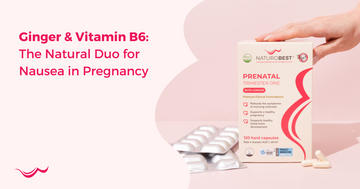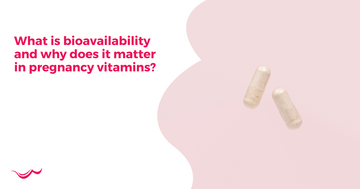What Do Prenatal Vitamins Actually Do in the First Trimester?
by NaturoBest Naturopath Team on Aug 19, 2025

A myth-busting guide to why early pregnancy vitamins matter.
Your baby’s development doesn’t wait. Neither should your prenatal routine.
The moment that second line appears on your test, everything changes—including your body’s nutritional needs. But here’s the thing most people don’t realise: by the time you see that positive result, some of the most critical steps in your baby’s development are already underway.
And yet, many women still wonder: Do I really need to take a prenatal vitamin this early?
What’s Actually Happening in the First Trimester?
The first 12 weeks of pregnancy are a time of rapid transformation.
Your baby starts out as a cluster of cells and by the end of the first trimester, they have a beating heart, forming organs, and the beginnings of a brain and spinal cord.
This stage is known as organogenesis—a delicate and complex process where the brain, heart, neural tube, and other vital structures begin to take shape. At the same time, the placenta is developing, laying the foundation for nutrient and oxygen exchange throughout your pregnancy.
It’s a small window with big implications.
Any nutritional gaps during this time may have consequences, which is why early, high-quality support is so important.
The Nutrients That Matter Most
You’ve probably heard about folate. But it’s not the only player in this story.
Here are four key nutrients your body needs during the first trimester—and why they matter so much:
Folate (Activated Form: 5-MTHF)
Folate helps support the formation of your baby’s neural tube, which develops into the brain and spinal cord. This tube closes by around week 4–6 of pregnancy—often before you even know you’re pregnant. That’s why folate before and during early pregnancy is so important.
Look for an activated form like 5-MTHF for better bioavailability, especially if you carry a common MTHFR gene variation that affects folic acid metabolism.
Iodine
Iodine supports the development of your baby’s brain and nervous system, and contributes to healthy thyroid function—critical for your metabolism and energy levels in pregnancy.
Deficiency is surprisingly common, especially in regions with low iodine in soil or diets lacking in seafood.
Vitamin B12
B12 works alongside folate to support red blood cell formation and healthy neurological development. Low B12 can affect your own energy levels and mood, while also impacting the development of your baby’s brain and nervous system.
The natural form of vitamin B12 found in food (hydroxocobalamin) converts into both active forms of B12 in the body: methylcobalamin and adenosylcobalamin, for better absorption.
Choline
An unsung hero, choline plays a vital role in early brain development and the formation of cell membranes.
Studies suggest many pregnant women don’t meet their daily choline needs through diet alone, making supplementation especially important in early pregnancy.
Why Bioavailability & Quality Matter
Not all prenatal vitamins are created equal.
Some formulas use cheaper forms of nutrients that your body struggles to absorb. Others pack too many ingredients into one capsule, reducing potency where it counts.
In early pregnancy, when nausea can make swallowing anything a challenge, quality matters more than quantity.
You want fewer, higher-quality nutrients in bioavailable forms that your body can actually use.
For example:
-
5-MTHF instead of synthetic folic acid
-
Hydroxocobalamin, the natural form of B12 found in foods (used by the body to create both active forms) instead of synthetic cyanocobalamin for B12
-
Iodine as potassium iodide
-
Inclusion of choline, often missing in standard multis
These choices can make all the difference when supporting your baby’s most crucial stage of growth.
A Smarter Way to Supplement in Early Pregnancy
Let’s be honest: pregnancy can be overwhelming.
From morning sickness and fatigue to food aversions and the mental load of “doing everything right,” it’s easy to feel like you're falling short.
But starting with the right prenatal can give you one less thing to worry about.
Our Prenatal Trimester One with Ginger is designed for early pregnancy:
-
Activated B vitamins to support energy and neural development
-
Iron free, iron can aggravate morning sickness and nausea
-
A gentle format including ginger to ease nausea and morning sickness
-
Vegan and practitioner-formulated
This is not a one-size-fits-all multi. It’s a targeted formula designed to meet the specific needs of the first trimester.
Why Starting Early Makes a Real Difference
Many of the nutrients critical for your baby’s development—especially folate, choline, and iodine—do their most important work in the first few weeks.
This is before the placenta is fully functional and before many women even book their first prenatal visit.
That’s why most experts (including the Royal Australian and New Zealand College of Obstetricians and Gynaecologists) recommend starting a prenatal at least one month before conception, if possible.
But if you’ve already found out you’re pregnant—start now. It’s never too late to support your baby’s development.
You’re Doing Better Than You Think
It’s easy to feel overwhelmed by advice and information during early pregnancy.
But supporting your body and your baby doesn’t have to be complicated.
Understanding the “why” behind your prenatal helps you take confident, informed action. And when you choose a high-quality formula tailored to your stage, you’re giving your baby the best possible start—right from the very beginning.
Want to learn more about what’s in our first trimester formula and why it matters?
Click here to explore our Prenatal Trimester One with Ginger and feel confident in your first trimester support.



